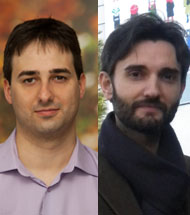2014_04_24_ICS_El taller de escritura creativa, herramienta útil para mejorar la capacidad lecto-escritora de los estudiantes de español
Creative writing workshop, a useful tool for improving the reading-writing ability of students studying Spanish
This was proposed in a scientific article by linguists Alberto Lucas, ICS, University of Navarra, and Ruben Pujante, University of Murcia

The creative writing workshop is a useful tool for improving the reading-writing ability of students studying Spanish, for stimulating their imagination and promoting their judgmental attitude. This was proposed by linguists Alberto de Lucas, Institute for Culture and Society (ICS) at the University of Navarra, and Rubén Pujante, at the University of Murcia and Universidad Rennes 2, in a scientific article published in Marco ELE review, within a monographic volume focusing on the current tendencies in ELE (teaching Spanish as a foreign language) research.
"Among the classic skills that are always covered in the teaching of languages, the oral aspect has gained prominence in these approaches, at the expense of writing. However, this is not only a problem for foreign language teachers. Teachers who are responsible for guiding the acquisition of the mother tongue have currently found that the number of readers declines year after year and the effect on the development of writing skills becomes increasingly clear ", they have pointed out point out.
As they describe in their work, the workshop involves the realization of a literary text- essentially narrative- as a final task to which several activities are assigned. This task is designed for students of secondary level, in the case of teaching a native language as well as teaching a secondary language, with an intermediate level of communicative competence.
Can be adapted to different students"A Literary Workshop makes the language an object of reflection and an axis of a communicative situation that, despite being created ex profeso for the classroom, it makes sense in itself and becomes reality, not just a mere imitation of reality.", emphasize the researchers.
Furthermore, they add that literary creation "allows the language to become a tool, in addition to the subject of teaching, for obtaining useful and attractive learning. In addition, it is a content that easily adapts to different kind of students, in terms of their tastes, interests, ages, backgrounds, cultures of origin, levels of language ... "
With regard to the methodological design, the teaching proposal consists of three phases: preparation, with a brief introduction, the objectives to be achieved and working techniques to be used; the analysis phase which contains the description of that which is contemplated, the narration of that which is recalled, collective reading followed by a discussion and debate; and results and interpretations which collect the students' opinions regarding the final evaluation of the tasks by means of a questionnaire.
Información de interés
El artículo completo: http://marcoele.com/taller-de-escritura-creativa/
